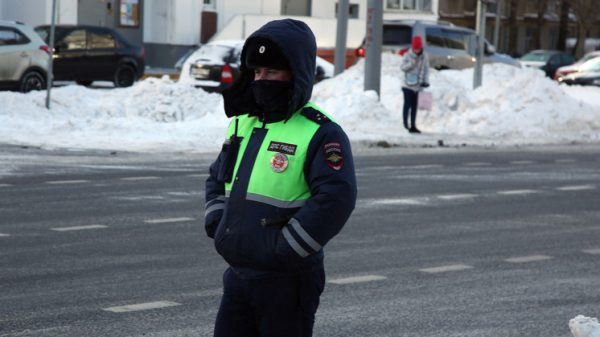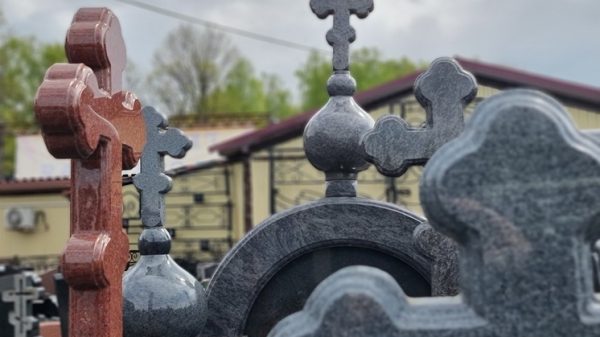 The entrance to the office of the Al Roeya newspaper, pictured in September 2022, before its closure. Photo: John Gambrel/AP
The entrance to the office of the Al Roeya newspaper, pictured in September 2022, before its closure. Photo: John Gambrel/AP
Looking back, many Al Roeya journalists say, the beginning of the end came one day 18 months ago: June 2, 2022.
That was the day when seemingly anodizing story published by United Arab Countries A newspaper from the Emirates began spreading like wildfire on social media.
In democracies, of course, most journalists are thrilled if a story “goes viral,” reflecting reader concerns and perhaps even causing a political unrest or two.
But in the UAE, where government censorship and control of the press is widespread, upsetting those in power can be a very bad idea indeed.
A few hours later, an article simply noting that some Emiratis are fed up with expensive fuel and a claim that some are moving to Oman to fill their tanks cheaper has been removed from the newspaper's website. It never made it into print.
But that was just the beginning.
Days later, a full investigation began into how the story, which was believed to embarrass the ruling regime, could have been ordered, according to those familiar with the events and interviewed by The Associated Press (AP).
Indeed, the story concerning the removal of government fuel subsidies was apparently sensitive enough to cause what the newspaper described as a «firestorm.»
Several staff members associated with this article, including senior editors, were called to answer questions. A lawyer was present and they were asked to detail every step — including the names of those responsible — of how the story was commissioned, edited and published.
According to the AP, among those conducting the interrogations were representatives of International Media Investments (IMI), the state-backed Abu Dhabi media investment company owned by Sheikh Mansour bin Zayed Al Nahyan, the billionaire brother of the UAE president .
IMI, in partnership with RedBird, a US private equity firm, is the potential owner of The Telegraph.
Back at Al Roeya's Dubai office in 2022, a fuel price inquiry yielded results. doesn't end with a checkmark.
Rather, the journalists associated with the story were suspended, the AP reported, before they were given the choice of either voluntarily resigning with benefits or being fired.
Loss vision.
But even this was not the end of the matter. A week later, IMI's CEO returned to Al Roeya's office for a general meeting.
There he announced that Al Roeya, which translates as “The Vision,” was disbanding ahead of the launch of an Arabic-language business venture with CNN known as CNN Business Arabia. According to the AP, at least 35 journalists were fired that day, and dozens more were fired later.
Moreover, according to the Wall Street Journal, one of those involved in the project to launch CNN Business Arab, was Jeff Zucker, then the head of CNN.
Today, as head of Redbird IMI, Mr Zucker is leading the attempt to take over The Telegraph. He insists there is no threat to the newspaper's editorial independence from its potential new owners.
 Jeff Zucker heads Redbird Try IMI take over The Telegraph. Photo: Clara Malden
Jeff Zucker heads Redbird Try IMI take over The Telegraph. Photo: Clara Malden
IMI argues that the newspaper's dissolution was long planned, had nothing to do with the fuel story or the newspaper's «editorial activities» and that all layoffs were carried out properly.
But news outlets in the UAE are well aware of the challenge of challenging the party line may have serious consequences.
In 2017, a business magazine was temporarily banned from publication after it published an article about failed real estate projects in Dubai.
Human Rights Watch and critics of the UAE government in exile told The Telegraph they were deeply concerned about the prospect of the newspaper being sold to RedBird IMI.
Joey Shea, UAE researcher at Human Rights Watch, said the crackdown on press freedom and freedom expression has had a «chilling effect on the few international media that can operate in the country.»
On the potential sale of The Telegraph, she said the group was «deeply concerned about the potential impact this would have on a newspaper so well known in the UK.»
Censorship is «rampant». '
The UAE uses sophisticated surveillance technology to monitor internet activity, phones and computers, violating rights to privacy and freedom of expression.
In 2021, its rulers amended the criminal code and cybercrime laws to strengthen state control over the media.
Article 174 provides for a minimum prison sentence of five years and a fine of 100,000 dirhams (£21,400) if the act of dissent is committed “in writing, orally, by drawing or statement, or by any technical means or through the media.”
“Online censorship is rampant, and the online media environment lacks diversity. Government surveillance of internet activists and journalists is pervasive and forces internet users to widely self-censor,” Freedom House, a Washington-based advocacy group, noted in a recent report on the UAE.
A 2022 Amnesty International report found that Emirati leaders are censoring media content deemed «immoral» and that at least 26 Emirati prisoners are in prison «due to peaceful political criticism».
< p>One journalist who was arrested in the UAE revealed to The Telegraph the details of his case, initiated under Sharia law. The Telegraph does not name them or provide any other identifying information to protect their identities.
The story was written without being able to identify the subject, who nevertheless filed a complaint for “insult,” a crime under Islamic law. The story did not mention age, gender, name or any other identifying factors.
 UAE Vice President and owner of IMI Sheikh Mansour bin Zayed Al Nahyan Photo: UAE PRESIDENTIAL COURT/via REUTERS
UAE Vice President and owner of IMI Sheikh Mansour bin Zayed Al Nahyan Photo: UAE PRESIDENTIAL COURT/via REUTERS
However, a criminal case was opened against the journalist and the case was referred to the highest levels of the country's legal system before it was even considered. fired. At one point, the journalist’s passport was confiscated due to a travel ban.
“It was the most terrible time,” the journalist said. “Everything was conducted in Arabic and I had no idea what was going on. I'm not used to a legal system where cases are tried personally against the journalist rather than against the newspaper, so this was a complete shock.
They added: «I couldn't travel… but I'm lucky I wasn't one of those jailed.»
Another human rights activist and government critic persecuted by the Gulf state is Ahmed Mansour , an engineer and poet, arrested under the UAE's cybercrime law in 2017.
The father of four was arrested the following year. sentenced by the Abu Dhabi Court of Appeal to 10 years in prison for «insulting the status and prestige of the UAE and its symbols, including its leader» for criticizing government policies.
Since then he has been kept in solitary confinement. , without a mattress or pillow, in conditions that “violate basic international human rights standards.”
Additional charges were brought against Mr Mansour last month during the Cop28 international climate change conference in Dubai as part of a massive trial against 84 people, some of whom have been jailed since the Arab Spring. Last week, the UN expressed concern that terrorism-related charges could lead to the death penalty or long prison sentences.
'A terrible persecution'
Michael Page, deputy Middle East and North Africa director at Human Rights Watch , said at the time that instead of using the climate change conference to free those unjustly imprisoned, “the Emirati government has decided to redouble its efforts to trample on their rights and keep them in prison.” by hook or by crook.»
Among those facing new charges was Hamad Al Shamsi, an Emirati human rights activist who was part of the UAE 94, a group of academics, activists and lawyers who stood trial. in 2013 for signing a petition calling for democratic reform.
Mr Al Shamsi, who was out of the country when he was charged, was sentenced in absentia to 15 years in prison and has served more than a decade lives in exile in Turkey.
He was sentenced to 15 years in prison in 2021. included on the government's terrorist list.
Mr Al Shamsi, chief executive of the Emirates Prisoners' Protection Centre, told The Telegraph he was «really concerned» about the safety of his peers. Many are being held beyond their original sentences.
He said his prosecution had been “horrible.” «Unfortunately they won't stop… the situation is very difficult,» he said.
Mr Al Shamsi said he had «a lot of concerns» about the potential sale of The Telegraph.
Mr Al Shamsi said he had «a lot of concerns» about the potential sale of The Telegraph.
p>
“The UAE government has a lot of money and they use that money to buy magazines, newspapers, football clubs and they use all these tools for their PR campaigns.”
He added: “You can't buy freedom people, but if you have enough money, you can deprive it.”
'Dangerous and slippery path '
Radha Stirling, head of the British legal aid group detained in Dubai, also raised concerns about the proposed takeover, which would affect the independence of British media.
“There is no sign that press freedom is an issue on the government's agenda UAE. If anything, press freedom has been further curtailed over the past five to ten years with the introduction of federal cybercrime laws and the crackdown on activists who express unfavorable ideas,” she said.
“It’s appalling that a country that locks up people jailed for their opinions even has the legal ability to own media in the UK. This is a dangerous and slippery slope and must not be allowed to continue.»
She added: «The UAE and other authoritarian countries are increasingly seeking to infiltrate [British] government, utilities, education and the media.» media, which ultimately poses a threat to British citizens and our security.»
As for Al Roeya, the last issue of the newspaper was printed on June 21, 2022, less than three weeks after the first article expressing discontent local residents. drivers.






















































Свежие комментарии